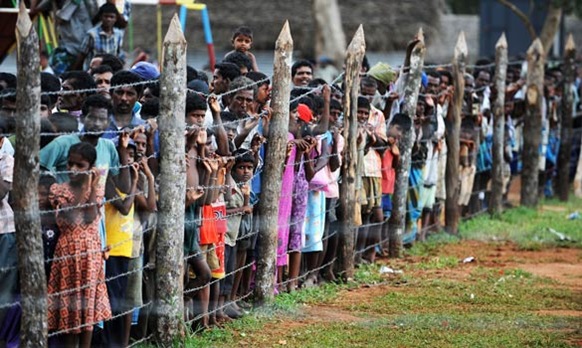 They were billed as “garments without guilt” — cheap, good-quality lingerie, casual clothes and sportswear made in Sri Lanka and sold in stores such as Next, Tesco and Marks & Spencer.
They were billed as “garments without guilt” — cheap, good-quality lingerie, casual clothes and sportswear made in Sri Lanka and sold in stores such as Next, Tesco and Marks & Spencer.
For the past four years, such clothes worth billions of pounds have been imported, tax-free, to the European Union under a trade scheme intended to help Sri Lanka’s recovery from the 2004 Boxing Day tsunami.
Within months, however, clothes from the country could disappear from British shops.
Although conditions in Sri Lanka’s factories are beyond reproach, the EU looks set to punish the Government’s alleged human rights abuses in the recent civil war by withdrawing the trade benefits.
The move threatens to destroy the livelihoods of 250,000 workers employed in hundreds of modern facilities, mostly clustered around Colombo, the capital. The garment industry indirectly supports up to a million of the country’s population of 20 million. Withdrawing the benefits, known as GSP (generalised system of preferences) Plus — would add 10 per cent to the cost of such products, forcing many retailers to seek cheaper alternatives. EU officials say that Sri Lanka has until tomorrow to respond to a damning human rights report, which concluded last month that the island no longer qualified for GSP Plus.
Marks & Spencer and Next confirmed that they sold garments from Sri Lanka but would not comment on the GSP Plus status. Tesco did not reply to requests for comment.
President Rajapaksa of Sri Lanka formed a committee of four Cabinet ministers on Friday to formulate their response, Sri Lankan officials said.
EU officials say that they expect an uncompromising response, and the report’s wording already makes it almost impossible to extend GSP Plus for another three years. “Given how critical the report is, and how Sri Lanka is likely to respond, it will now be very hard to extend it,” one EU diplomat familiar with the report told The Times.
The EU has led international criticism of Sri Lanka’s conduct of the war, which ended with the total defeat of the Tamil Tigers in an apocalyptic last stand, and has backed calls for an independent inquiry into allegations of war crimes on both sides.
Withdrawing GSP Plus would be by far the most drastic international response yet to the war’s bloody finale in May, in which UN officials estimate 20,000 civilians died.
“GSP Plus is crucial,” said Kumar Mirchandani, the head of the Sri Lanka Apparel Exporters Association, which coined the “garments without guilt” slogan. “Withdrawing it would mean a lot of hardship — a lot of small and medium-sized enterprises going out of businesses.”
GSP Plus explicitly obliges Sri Lanka and other beneficiary countries to comply with 27 international agreements on human rights issues. The country last year refused to let an EU team investigate alleged abuses so the EU used independent consultants to examine whether Sri Lanka had violated the UN Convention Against Torture, the UN Convention on the Rights of the Child, and the UN Covenant on Civil and Political Rights. They described a culture of “complete or virtually complete impunity in Sri Lanka”, citing police torture, abductions of journalists and uninvestigated disappearances. They also criticised the detention of almost 300,000 ethnic Tamils in internment camps.
Sri Lankan officials accused the EU of seeking to punish ordinary garment workers.
The Sri Lankan Government has promised to give $150 million to the garment industry and to boost exports to India, China and other countries that were less critical during the civil war. Industry insiders say that is unrealistic as the EU this year became the biggest market for Sri Lankan garments, taking 52 per cent of exports.
Mr Mirchandani said that without GSP Plus, Sri Lanka could not compete with countries such as Bangladesh, which also gets tax-free access to the EU under a separate scheme. “Price pressure is so high . . . people move away over a difference of 10 cents,” he said. “We can’t take 10 per cent off our prices — we don’t have those margins.”
Sri Lankan connection
Next Has a factory in Sri Lanka that “specialises in soft jerseys”, a category that includes T-shirts — and items with prints, washed finishes and “embellishments” — a checked belted tunic, £25 PIC OF THIS COMING
Tesco Parts of the company’s Cherokee range are produced in Sri Lanka. Tesco also buys wool from a Sri Lankan knitting mill and has a contract with a Sri Lankan button and zips manufacturer
(For updates you can share with your friends, follow TNN on Facebook and Twitter )
